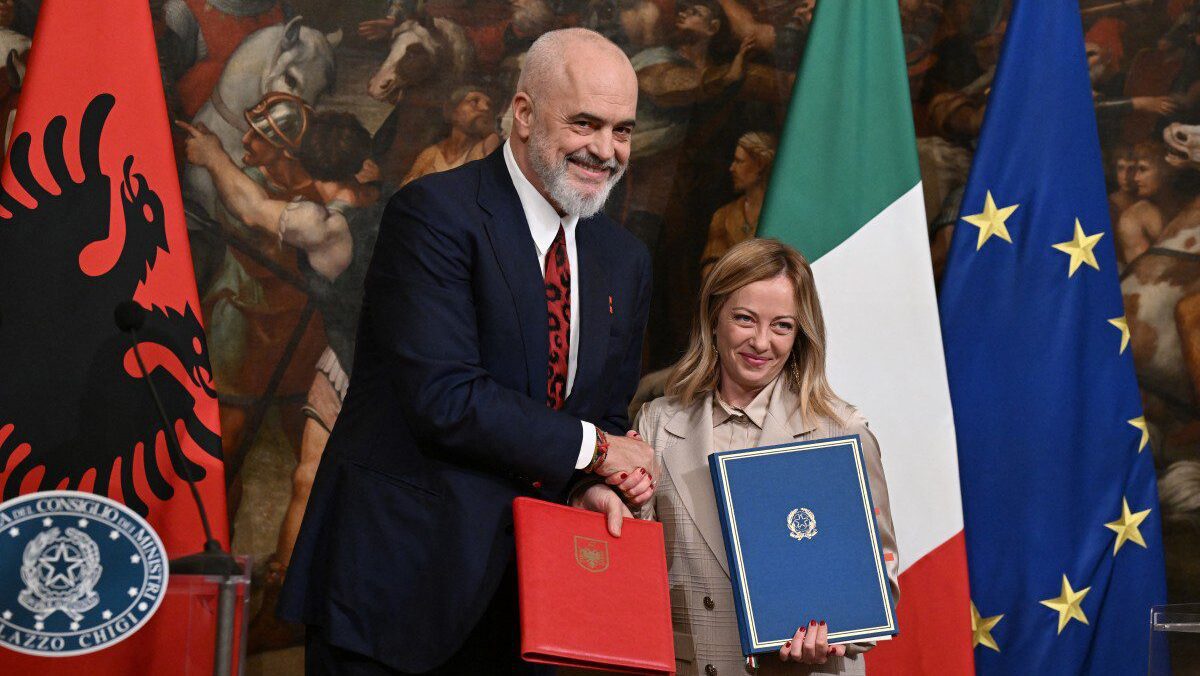
Italy’s Prime Minister, Giorgia Meloni and Albania’s Prime Minister Edi Rama give a joint press conference as they signed an agreement on migrations at Palazzo Chigi in Rome on November 6, 2023.
Photo: Tiziana FABI / AFP
Amid the highest number of illegal migrant arrivals in nearly a decade, Italian Prime Minister Giorgia Meloni has finalised a deal with Albania to build two migrant centres where illegal migrants will be sent after being rescued at sea.
Meloni signed a memorandum of understanding alongside her Albanian counterpart Edi Rama on Monday, November 6th, with the agreement facilitating the creation of migrant centres that will be able to handle around 36,000 people per year, a report from the newspaper Il Giornale states.
“It is a Europe-wide agreement. It shows that you can collaborate on the flow management front. Albania will give the possibility to use some areas of Albanian territory with Italy being able to set up centres,” Prime Minister Meloni said following the signing of the memorandum.
“The agreement provides for setting up migrant centres in Albania that can hold up to three thousand people,” Meloni said and added, “When we started discussing it, we started from the idea that mass illegal immigration is a phenomenon that no European state can tackle alone.”
Migrants who manage to get to Italian territory on their own accord aboard boats or by land will not be covered under the new agreement as it only applies to those picked up or rescued at sea by Italian ships. It also does not cover those picked up by migrant taxi NGOs.
Migrants will be taken aboard Italian vessels to Shengjin, a port town on the Adriatic Sea, where they will be identified and processed and later taken to Gjadër, a municipality in the country’s northwest where a reception facility will be built.
The facility is expected to be built and operational by next spring according to Prime Minister Meloni, who stated,
Albania confirms itself as a friendly nation and although it is not yet part of the Union it behaves as if it were a member country and this is one of the reasons why I am proud that Italy has always been one of the countries supporting enlargement to the Western Balkans.
The new deal comes as Italy has seen 144,675 illegal arrivals this year as of November 5th, according to statistics from the United Nations Refugee Agency UNHCR. The number is the highest the country has seen since 2016 when 181,436 illegal migrants arrived.
In recent weeks, several European countries have expressed an interest in outsourcing asylum claims to other countries.
In Germany, Ann-Veruschka Jurisch, the parliamentary rapporteur on migration for the Free Democrats, a member of the governing German federal coalition, proposed last week that Germany send migrants abroad to non-European Union countries to process their asylum claims.
“I expect the interior minister to review as soon as possible how processing asylum claims in third countries can be facilitated, as this is what we agreed in our coalition agreement,” she said, in reference to the so-called “traffic light” coalition deal between the FDP, the Social Democrats (SDP) and the Greens.
The policy was also advocated by North Rhine-Westphalian Prime Minister Hendrik Wüst, who called on Chancellor Olaf Scholz to begin negotiations with non-EU countries and offer them financial incentives
“This means that those who cannot expect protection status do not come to our country in the first place. In doing so, we must provide financial support to these partner countries. It’s about agreements with performance and consideration,” he said and added, “The partner state should declare its readiness to take back anyone who irregularly crosses the sea and land borders from its country to the European Union.”
Other EU countries such as Sweden, Denmark and Austria have also expressed support for outsourcing asylum claims, though Denmark initially attempted to strike a deal with Rwanda but paused the deal in January of this year after the new national government was formed.
Migration and Integration Minister Kaare Dybvad explained the change in policy saying, “We still have the same ambition, but we have a different process. The new government’s program calls for the establishment of a reception centre outside Europe in cooperation with the EU or other countries.”
However, the countries may run into future difficulties regarding their programmes in a similar fashion to the UK, which saw the European Court of Human Rights (ECHR) halt the first flight of migrants to Rwanda in June of last year after the UK had negotiated a deal with the African country to send migrants there for asylum claim processing.
